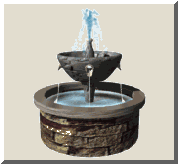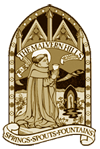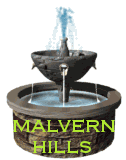Take a Walk on the Wild Side?
With Christmas and the New Year approaching, now is the time to consider how we are going to exercise off all that over eating that almost inevitably comes with the festive season. Why not give a copy of our Great Malvern Water Trail to a family member or friend and then suggest that you go on an impromptu walk around the town and discover all those springs and wells sites? This is just the thing for one of those quiet afternoons after Christmas, especially if you have friends or family and do not really want to go clambering the hills as the light fades and the weather closes in. The popular walking guide is available direct from Cora (address at the end of this newsletter) or from Tourist Information Centre in town or via our web site www.malvernspa.com The price is £1.95.  However for those wishing to give as presents or take a party, 5 can be purchased from Cora for 9 pounds. The price includes postage where applicable.
However for those wishing to give as presents or take a party, 5 can be purchased from Cora for 9 pounds. The price includes postage where applicable.
Nomination for the St Werstan Award for the enhancement of Malvern's water heritage, in conjunction with Malvern, The Original, English Water.
The Royal Well is located on the
West Malvern Road, near the Wyche Cutting. Recent work by the owners and the HLF team has resulted in major improvements to the facility. We are therefore pleased to receive this nomination for the award.
Carol and Wayne are the proud owners of the house with the water feature in their front garden alongside the road. Work by
Wayne on the water supply which runs beneath their lounge has resulted in a substantial improvement in the flow rate as well as making an unusual indoor feature below a large glass slab set in their lounge floor. Coordinating with
Wayne was David Armitage who is responsible for implementing the Heritage Lottery Funding project for Malvern's Springs and Wells. As a result the spout has been opened up to reveal the original level of the roadside basin and a special swan neck pipe added. A coat of arms now adorns the enhanced arch above the spout and a new stone tablet has replaced the decayed original.
As a result a Friend has nominated the site for the St Werstan Award. The St Werstan Award is based on six criteria: preservation, environment enhancement, public accessibility, provenance, maintenance and general WOW! This site arguably manifests all six. It preserves the heritage by drawing attention to the historic site and built surrounds. It substantially enhances the environment. The fountain can be viewed by the public from the road and thus has good public accessibility. The provenance of the site is well documented and is important in that it celebrates the historic West Malvern Spa. The owners maintain the site in tidy condition, in spite of it being adjacent to the public highway and therefore subject to litter and possibly vandalism. Now Royal Well joins the elite few sites that still have water in abundance. As such it is a location with a considerable WOW factor for enthusiasts of Malvern Springs and Wells and the local community. Do go along and have a look - full historic background is given in the book Aquae Malvernensis.
Do go along and have a look - full historic background is given in the book Aquae Malvernensis.
Should The Royal Well get the St Werstan Award - you decide?
URGENT - Please complete and return the ballot form enclosed with this newsletter to decide whether this site should receive the award. It is Friends who decide.
If you receive the Newsletter by email please print off and return the ballot page. You must however include your name and address when returning the form.
Malvern Spring at Cleobury Mortimer
The people of the Worcestershire town of
Cleobury must have had their eye on an opportunity when they decided to install an illustration of a Malvern spring in the
Church of
St Mary's. In the east window above the main altar there is a picture of what is generally thought to be the Pewtriss Well  - later renamed the Primeswell. The stained glass window was a gift of the Rev. Baldwyn Childe in the 1870s and depicts William Langland, author of the Vision of Piers Plowman, falling asleep on the
Malvern Hills. William Langland was born about 1332 and died circa 1400. He was supposedly born at Cleobury and took holy orders at Malvern. His work takes an enlightened, cynical view of the medieval church. His memory lives on in the stained glass window. It is well worth viewing if you are passing through. Our thanks to the Friend who informed us of this.
- later renamed the Primeswell. The stained glass window was a gift of the Rev. Baldwyn Childe in the 1870s and depicts William Langland, author of the Vision of Piers Plowman, falling asleep on the
Malvern Hills. William Langland was born about 1332 and died circa 1400. He was supposedly born at Cleobury and took holy orders at Malvern. His work takes an enlightened, cynical view of the medieval church. His memory lives on in the stained glass window. It is well worth viewing if you are passing through. Our thanks to the Friend who informed us of this.
Who are Friends? Friends promote research, conservation and celebration of the Springs, Spouts, Fountains and Holy Wells of the Malvern Hills and of Great Malvern as a
Spa
Town. If you would like any back numbers of our Newsletters send a large SAE to Bruce with details of which ones you require. There is no charge and they are now collector's items! 
Holy Well getting long awaited upgrade.
Those of you who keep an eye on what is going on will be aware of developments at Holy Well. We photographed the temporary spout recently and need to assure readers that this is not the intended final facility! The old bottling room has been gutted and it is hoped that an enhanced public facility will result as well as the possible reinstatement of a bottling enterprise. The Heritage Lottery Fund team is involved and we await the outcome of their project with anticipation. However, work at Holywell has been delayed by the discovery of bats and several structural problems. Having engaged consultants for both the bats and the structure we are hoping that work will be able to resume soon.
Other work by the HLF team is included in these notes supplied by David Armitage:
The water pipe from Westminster Bank to West Malvern Tap has been relaid. To minimise the digging, a mechanical mole has been used. The water started to flow on 08/08/08. In contrast the water supply at the Clock Tower has dried up and puzzlingly this was after heavy rain! We are investigating this, but recognise that the water supply here was always intermittent.
Beauchamp Spout on
Cowleigh Road has had its drain improved. Now the challenge is to try to restore the green bricks. The original bricks have been mottled by time and so an exact colour match will not be possible. We have engaged a local potter to make some sample bricks.
Though complete, concerns have been raised that the new bifurcating spout on Hayslad might not be producing the statutory flow. However, there is no need for concern as each nozzle on the spout can produce the required flow. The last measurement taken in high summer indicated that 3 times the required flow was coming out of the bifurcating spout.
It is hoped to add St Jamesís Spout in the
West Malvernís churchyard to the list of spouts restored. The budget allows for a bit of dowsing to see if there is a viable water source nearby, and so restore the flow to the spout.
New Malvern Spa - A Friend's Experience
In the last letter we announced the new Malvern Spa. Now Ken Crump gives us his first hand comments.
In the 21st century you can once again bathe in the Malvern source water at the new Malvern Spa Hotel in the
Elgar
Business
Park off
Townsend Way, Malvern. This is not a spa in the traditional way of thinking. This is a state-of-the-art spa with all the latest equipment and gadgets and health treatments that go with a modern 21st century health facility. The building complex is a functional block with a reception area that is plain, clinical and functional. Staff are very welcoming and keen to help. I noted a water dispenser in the corner that was NOT Malvern Water! During a tour the most impressive part for me was the hydrotherapy pool, supplied with Malvern source water. The connected indoor and outdoor pools were heated and had good lighting effects at night. Adjacent were the herb sauna, salt grotto, crystal steam room, sauna of senses and an ice fountain. The grand salon relaxation area is also impressive with its adjacent brasserie. The health club and gym with various massage treatments are all top of the range. Being a traditionalist I would have liked to see a pump room where one could actually imbibe Malvern Water. This I feel would be a very attractive feature perhaps linked with information about the history of Malvern Springs and Wells and the Hills. Information in the form of a booklet or map would be useful.
For more information see www.themalvernspa.com
Cwm
Dale
Spring
In the 1980s the
Cwm
Dale
Spring at Church Stretton in Shropshire was the leading bottler of
UK source water. Like Malvern, Church Stretton has a long history of bottling its natural waters as well as being a popular spa town. The Stretton Hills Mineral Water Company was active in the 1880s opening a purpose built factory on the
Shrewsbury Road, to the north of the main village. Products included soda water and lemonade all manufactured locally from the source water. Queen
Victoria was so impressed that she decreed that the governors of the colonies should all enjoy Stretton Water and it was shipped worldwide. Alongside this a Stretton spa tourism industry was founded with visitors flocking to the local hydro. In 1985 the
Cwm
Dale
Spring received recognition under the Mineral Water Regulations and this led to an era of success that saw products like Cwm Dale Mineral Water with a dash of lemon appear in supermarkets throughout the land. Bruce was privileged to be part of this enterprise at the time and arranged for a gazebo to be erected near the spring. It was opened by non other than Percy Thrower, the gardening celebrity, in 1986 to commemorate the recognition of the Cwm Dale Waters. In the picture a rather younger Bruce assists with the tree planting. Recent inspection reveals that the gazebo is still there and so is the tree that Percy Thrower planted at the time. Amusingly the gazebo was nicknamed Osborne's Folly locally (as Cora says 'just one of a number of weird things Bruce will no doubt go down in history for'). Today the bottling works on the
Shrewsbury Road continues successfully to produce bottled waters. If you are in the area do seek out the bottling works with the gazebo behind. There are many attractions to see in and around Church Stretton and we hope to arrange a conducted coach trip for Friends in due course. Do let us know if you would be interested in joining the day trip
 St Werstan gains academic recognition.
St Werstan gains academic recognition.
Birkbeck, University of London have recently carried out a detailed formal review of our published research findings The Illumination of St Werstan the Martyr (2007 2nd edition) The publication sets out the case for understanding the establishment of the first religious cell in Malvern near a spring on the Malvern Hills in the 11th century, leading to the eventual establishment of the priory and Malvern itself. St Werstan was the founder of the cell and following our scholarship has been recognised as the patron saint of Malvern Springs and Wells. J Scott McCracken, the notable archaeologist from Birkbeck, not only considered the findings as set out but has also proposed a number of new lines of investigation which will assist further in bringing St Werstan out of the shadows. We are hopeful of working with Scott to initiate one or more projects to pursue the issues raised; initial enquiries and planning are now underway. We also hope in due course to organise an evening lecture to bring everyone up to date on St Werstan and the Birkbeck evaluation. In the meantime if you would like a copy of the book they are obtainable from the Malvern Priory bookshop or direct from Cora for 9 pounds 99 pence.

The
Florence Nightingale Fountain Rediscovered!
In our last Newsletter you will have read of Florence Nightingale's visit to Malvern following the mental breakdown she suffered as a result of her Crimean War experiences. Since then one of our roving Friends has visited the barrack at Scutari which was used as the English hospital during the Crimean War. The barracks were built in 1828 and described in 1836 by Istanbul resident Julia Pardoe as magnificent, nearly quadrangular with arched cloisters which provided enough space for drill during bad weather, and large enough to accommodate 15,000 men. She noted that the cleanliness of the rooms was beautiful, that the kitchen provided ample and good food, and much of the food storage space was lined with marble. Lord Raglan himself chose to stay here rather than at the
Feriye
Palace, which had been appointed for him by the sultan.
By the time Florence Nightingale arrived, so many shiploads of wounded English soldiers had arrived from the
Crimea that the barrack hospital could not cope. She found rats, excrement and blood everywhere; no bandages, medicine or antiseptic; barely any food, and a huge daily death rate. Little by little Florence Nightingale and her nurses cleaned and bought necessary supplies for the men. The photograph shows one of the original marble fountains that Florence Nightingale would have used for her water supply. For a modern day guide see Selimiye Barracks From Past to Present, produced by the Department of National Palaces, (2005).
Email: springs@thespas.co.uk (click here to send an email)




 However for those wishing to give as presents or take a party, 5 can be purchased from Cora for 9 pounds. The price includes postage where applicable.
However for those wishing to give as presents or take a party, 5 can be purchased from Cora for 9 pounds. The price includes postage where applicable.
 Do go along and have a look - full historic background is given in the book Aquae Malvernensis.
Do go along and have a look - full historic background is given in the book Aquae Malvernensis.
 - later renamed the Primeswell. The stained glass window was a gift of the Rev. Baldwyn Childe in the 1870s and depicts William Langland, author of the Vision of Piers Plowman, falling asleep on the
- later renamed the Primeswell. The stained glass window was a gift of the Rev. Baldwyn Childe in the 1870s and depicts William Langland, author of the Vision of Piers Plowman, falling asleep on the



 St Werstan gains academic recognition.
St Werstan gains academic recognition.

 Newsletter Archive which can also be accessed from our WEB SITE INDEX.
Newsletter Archive which can also be accessed from our WEB SITE INDEX.




